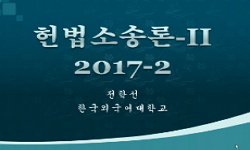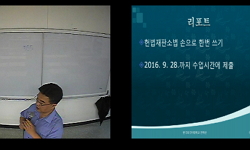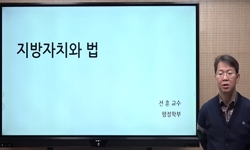Through the Corruption Reporting System, corruption in the public sector can be prevented, and the basic rights of the people can be protected and the adequacy of administration can be secured. However, issues regarding conflicts between organizations...
http://chineseinput.net/에서 pinyin(병음)방식으로 중국어를 변환할 수 있습니다.
변환된 중국어를 복사하여 사용하시면 됩니다.
- 中文 을 입력하시려면 zhongwen을 입력하시고 space를누르시면됩니다.
- 北京 을 입력하시려면 beijing을 입력하시고 space를 누르시면 됩니다.

국민권익위원회의 신분보장등 조치결정에 대한 연구 = A study on the decision to guarantee status by the Anti-Corruption and Civil Rights Commission
한글로보기부가정보
다국어 초록 (Multilingual Abstract)
Through the Corruption Reporting System, corruption in the public sector can be prevented, and the basic rights of the people can be protected and the adequacy of administration can be secured. However, issues regarding conflicts between organizations and members or between members through corruption reporting, and explicit or implied disadvantages to corruption reporters(whistleblower) are constantly being raised. Therefore, in order to solve this problem, Article 62-2 of the Anti-Corruption Rights and Civil Rights Commission Act allows corruption reporters to apply for measures such as guaranteeing their status to the Anti-Corruption and Civil Rights Commission if they have received or are expected to receive disadvantageous measures for reporting. By the way, it is clear that the Anti-Corruption and Civil Rights Commission's decision on measures such as guaranteeing the status of the head of the agency to which the reporter belongs is a measure to protect the rights and interests of the reporter, but on the other hand, it would violate the constitutional or statutory authority of the head of the affiliated agency. Therefore, an in-depth study on this is required.
First, the Anti-Corruption and Civil Rights Commission's decision to guarantee status is an internal act between administrative agencies and not an act regulating the rights or duties of citizens, so it cannot be regarded as an administrative disposition as a subject of an appeal lawsuit. Accordingly, a lawsuit in which the head of an affiliated agency contests a decision on to guarantee status against the Anti-Corruption and Civil Rights Commission should be regarded as an institutional lawsuit, which is a lawsuit about the exercise of authority between administrative agencies, not an appeal lawsuit. In this way, if the administrative litigation regarding the decision to guarantee status is regarded as an institutional litigation, there is no problem in theory that Article 62-4 of the Anti-Corruption Rights Commission Act limits the eligibility of plaintiffs and the subject of suit, and sets the filing period very short. However, the current regulation limiting the filing period to 30 days due to excessive focus on the protection of whistleblower is not appropriate in light of the nature of institutional litigation aimed at resolving disputes over authority between institutions. Therefore, it is reasonable to amend the Act so that a lawsuit can be filed within 60 days from the date of notification of the decision to guarantee status. In addition, the current regulations do not have a separate objection provision in case the whistleblower's application for guarantee of status is rejected or rejected. So, it is necessary to establish a new regulation on the whistleblower's right to file a lawsuit so that he can file a lawsuit with the court.
국문 초록 (Abstract)
부패행위 신고제도를 통하여 공직사회의 부패를 예방하게 되어 국민의 기본권을 보호하고 행정의 적정성을 확보할 수 있게 되었지만, 부패신고를 통한 조직과 구성원 사이 또는 구성원 사...
부패행위 신고제도를 통하여 공직사회의 부패를 예방하게 되어 국민의 기본권을 보호하고 행정의 적정성을 확보할 수 있게 되었지만, 부패신고를 통한 조직과 구성원 사이 또는 구성원 사이의 갈등의 문제라든가 부패신고자에 대한 명시적․묵시적 불이익에 대한 문제가 끊임없이 제기되고 있다. 따라서 이러한 문제를 해결하기 위해 부패방지권익위법 제62조의2는 부패신고자가 신고를 이유로 불이익조치를 받았거나 받을 것으로 예상되는 경우, 국민권익위원회에 신분보장등 조치를 신청할 수 있도록 하고 있다. 그런데 국민권익위원회가 신고자가 속한 소속기관장에게 신분보장등 조치결정을 하는 것은 신고자의 권익을 보호하는 조치임이 분명하지만, 한편으로는 소속기관장의 헌법상 또는 법률상 주어지는 권한을 침해하는 것이 될 것이기에 이에 대한 깊이 있는 고찰이 필요하다.
먼저 국민권익위원회의 신분보장등 조치결정은 행정기관 사이의 내부행위일 뿐 국민의 권리나 의무를 규율하는 행위가 아니므로 항고소송의 대상으로서 행정처분에 해당한다고 볼 수 없다. 그에 따라 소속기관장이 국민권익위원회를 상대로 신분보장등 조치결정을 다투는 소송도 항고소송이 아니라 행정기관 상호간의 권한의 행사에 대한 소송인 기관소송으로 보아야 한다. 이와 같이 신분보장등 조치결정에 대한 행정소송을 기관소송으로 본다면 부패방지권익위법 제62조의4가 원고적격과 소의 대상을 제한하고 아울러 제소기간을 매우 짧게 잡고 있는 것은 기관소송 법정주의를 취하는 우리나라에서는 이론적으로는 별 문제가 없다. 다만 지나치게 신고인 보호에 치우쳐 제소기간을 30일로 제한하는 현재의 규정은 기관 사이의 권한의 분쟁을 해결하려는 기관소송의 본질에 비춰볼 때 타당하지 않으므로 신분보장등 조치결정을 통보받은 날부터 60일 이내에 제소할 수 있도록 개정하는 것이 타당하다고 생각한다. 또한 현재의 규정은 신고자의 신분보장 등의 조치 신청이 각하되거나 기각된 경우에 별도의 불복규정을 두고 있지 않은데, 이러한 경우에도 법원에 제소할 수 있도록 신고자의 쟁송제기권에 관한 규정을 신설하여야 할 것이다.
동일학술지(권/호) 다른 논문
-
현행 노조회계시스템의 내용과 회계부정방지방안에 관한 고찰
- 한국부패방지법학회
- 김남욱
- 2023
- KCI등재후보
-
미국의 부패경찰관 규제시스템에 관한 연구 - 뉴욕경찰청을 중심으로 -
- 한국부패방지법학회
- 허경미
- 2023
- KCI등재후보
-
- 한국부패방지법학회
- 이순자
- 2023
- KCI등재후보
-
스포츠 뇌 도핑(brain doping)과 인권: 부패방지의 관점에서 보는 뇌 도핑
- 한국부패방지법학회
- 엄주희
- 2023
- KCI등재후보




 스콜라
스콜라





